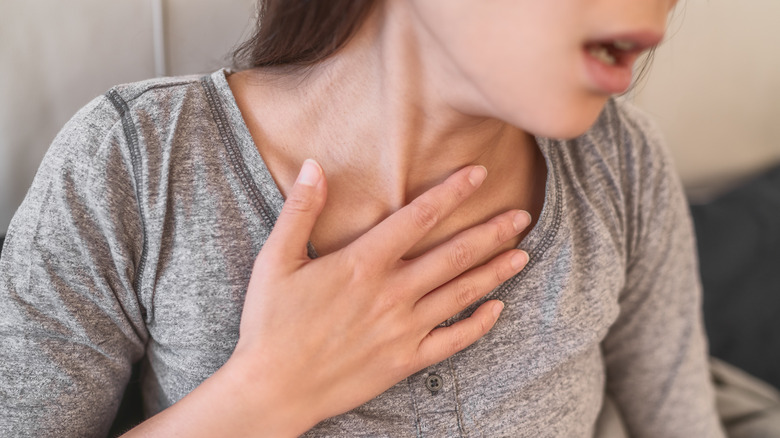What It Really Means When The Right Side Of Your Chest Hurts
When a person experiences chest pain, they often worry that they are experiencing a heart attack. To be clear, heart disease is the most common cause of death in the United States, according to the Centers for Disease Control and Prevention (CDC), so we should always be vigilant in detecting signs of heart problems. Chest pain is a common symptom of a heart attack (via American Heart Association), but heart attacks and even heart-related problems in general are not always responsible for chest pain.
While pain on the left side of the chest is often associated with a heart attack, the same is rarely true for pain on the right side of your chest, says Healthline. In fact, your culprit could be as simple as a strained muscle from overexerting yourself during physical activity. Heartburn, costochondritis, and acid reflux are other possible causes. Your chest pain could also be caused by a panic attack.
However, these aren't the only possible causes of pain on the right side of the chest.
More possible causes of chest pain on the right side
The NJ Cardiovascular Institute notes that shingles can cause sharp chest pain even before a person develops a rash. Sudden, sharp chest pain can also be caused by pleurisy, says the American Academy of Family Physicians. According to Healthline, other potential culprits include heart inflammation, a collapsed lung, pulmonary hypertension, or a pulmonary embolism.
Clearly, some culprits of chest pain are more concerning than others. With this in mind, Medline Plus recommends getting immediate medical care if your chest pain feels crushing, if it doesn't go away, or if it is accompanied by nausea, sweating, dizziness, or difficulty breathing. Another red flag raised by Healthline is severe pain that shoots through the arms, back, neck, jaw, or stomach.
The University of Alabama at Birmingham adds that people with heart disease or who are at high risk of heart attacks should get immediate medical care if they experience any chest pain, just to be safe. According to Cleveland Clinic, this is particularly urgent if the pain lasts longer than five minutes and isn't alleviated by rest or medication.


